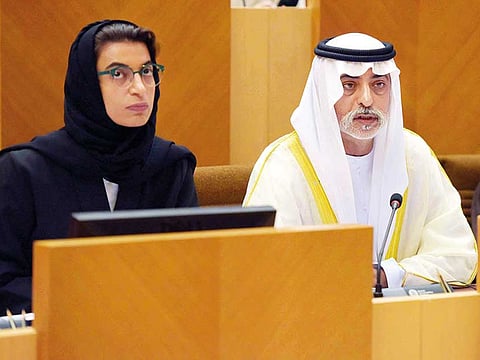FNC demands effective emergency management plan
UAE’s preparedness focuses on readiness to respond to all emergencies

Abu Dhabi: Members of the Federal National Council on Tuesday demanded a more effective nuclear, biological and chemical emergency management plan be put in place.
The members of the House said the plan should build on the country’s already existing emergency response system that focuses on preventing hazards to people, primarily from potential natural disasters; preparedness or continuous planning, organising, training, equipping, exercising, evaluating, and taking corrective action; and coordination and management of resources.
The representatives also demanded that the plan must also focus on recovery activities that continue beyond the emergency period to restore critical community services and manage stabilisation and mitigation efforts to reduce loss of life and property by lessening the impact of disasters and emergencies.
Mohammad Bin Kardous Al Ameri, a member from Abu Dhabi, raised a question to the National Emergency Crisis and Disaster Management (NCEMA) — the national emergency authority — about shelters and evacuation plan.
“The plan should help responders to develop flexible plans for evacuation and sheltering that can be used across the UAE in a wide range of scenarios and that reflect work undertaken across the country,” Al Ameri said.
He added the plan should also sharing good international practices including information on risk-based planning, evacuation, shelters, communications and the media as well as return and recovery.
Dr Jamal Al Hosani, director-general of the National Emergency Crisis and Disaster Management Authority, told the House that the authority leads emergency management plans in coordination with the Armed Forces, the Interior Ministry, the Red Crescent and other authorities.
Stressing that the UAE has an effective emergency management plan, Dr Al Hosani said there was always room for improvement. “Training and exercising plans are the cornerstone of the UAE’s preparedness which focuses on readiness to respond to all hazardous incidents and emergencies,” Dr Al Hosani said.
The duty of the national emergency authority is to coordinate and manage resources (including personnel, equipment, and supplies) as well as oversee recovery and mitigation efforts that begin immediately after the threat to human life has subsided to bring the affected area back to normal, Dr Al Hosani explained.
Salem Ali Al Shehi, a member from Ras Al Khaimah, asked about a road map for the implementation of the Sendai Framework for Disaster Risk Reduction.
Dr Al Hosani said the UAE signed the Sendai framework 2015-2030 in the Arab region to achieve a substantial reduction in disaster losses.
“The strategy is intended to revitalise the system for disaster risk coordination established by the League of Arab States. Member countries have also committed to completing the work of establishing national disaster loss databases across the region.
The Sendai framework emphasised the roles of stakeholders in implementing these actions and the need for cooperation and clarity of roles in implementing the priorities. Priorities are closely connected to reduce related risk factors and reinforce disaster preparedness measures to respond effectively at all levels. The strategy provides guidelines for international institutions and countries to use in reducing risks of disasters and for preparing to respond to disasters when they occur.
Sign up for the Daily Briefing
Get the latest news and updates straight to your inbox



